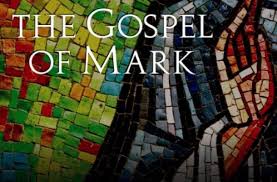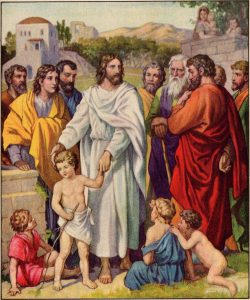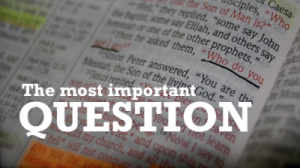 This Gospel reading from Mark is only a glimpse into a single day that the church wisely spreads over a few weeks of readings. It gives us the opportunity to study each event of the day more closely. We get the impression that it would have been a challenge for the people following Jesus to keep up with Him. You may have noticed one of Mark’s favorite words is “immediately.” He uses it twelve times in the first chapter alone. So far in the story, Jesus has called four fishermen to leave their nets and their boats and follow him, which they did “immediately. In last week’s portion from Mark, a demon-possessed man challenged Jesus who promptly told the unclean spirit to be silent and come out. The demon obeyed “immediately”.
This Gospel reading from Mark is only a glimpse into a single day that the church wisely spreads over a few weeks of readings. It gives us the opportunity to study each event of the day more closely. We get the impression that it would have been a challenge for the people following Jesus to keep up with Him. You may have noticed one of Mark’s favorite words is “immediately.” He uses it twelve times in the first chapter alone. So far in the story, Jesus has called four fishermen to leave their nets and their boats and follow him, which they did “immediately. In last week’s portion from Mark, a demon-possessed man challenged Jesus who promptly told the unclean spirit to be silent and come out. The demon obeyed “immediately”.
The next part of the story happens over the next few hours of the same day. The band of men went to Simon’s house, maybe because it was closest to the synagogue. Or maybe it was because Simon’s mother-in-law had the reputation for quickly putting a nice spread on the table. But today she is down with a fever. Simon doesn’t miss a beat. He tells Jesus this “immediately”. Perhaps he does this to apologize for the woman not greeting them at the door.
Jesus doesn’t say a word. He simply takes the woman by the hand and brings her to her feet. The fever is gone “immediately”. As Jesus brings her to her feet, the verb Mark uses is identical to the one he uses later in the Gospel to describe Jesus’ resurrection from the dead: He lifts her up. The mother-in-law “immediately” responds by getting busy on dinner preparations.
Then, in the early hours before sunrise while it was still dark as night, it sounds like Jesus tiptoed out of the house. Scripture tells us He went to a deserted place to pray (not a desert – there was not desert nearby). This was the only place on this night, with many others to follow, where he could talk one-on-one with his Father, without interruption. But it didn’t last long. Our English translation says Peter and the others PURSUED him. Think of a mother having escaped to the bathroom for a few minutes of aloneness. “Mom are you in there?” Or a prioress who leaves her office for a few minutes. “You’re never in the office!” Peter tells Jesus “EVERYONE is looking for you.” Jesus’ response probably was not what they were expecting to hear. “Let’s go to the neighboring towns so I can preach there, too. That’s my job.” The disciples were at a crossroads, at one of those “bend in the road” moments. Do we stick with this fellow who can never say NO to any request? Do we keep following?
That’s a choice we must make many times over in our lives. It begins each and every day with “Shall I hit the snooze button and roll over, or turn off the alarm and get to chapel to join in communal prayer?” It’s a choice we make in multiple ways, probably more times than we realize, throughout each day and into the evening. What word of kindness can I share? Can I tear myself from what I’m doing to get to chapel with some breathing space before prayer begins? At night, will I force myself to stay awake to finish this chapter or TV program, or do I go to bed so I’ll be rested for the morrow with all its new challenges and choices?
The people of Capernaum missed the point. They showed up for the miracles, but they failed to hear and absorb Jesus’ message. It’s the same news Jesus wants to share with you, with us. Repent, turn away from your old ways, and believe the Good News that God is with you in the NOW Are you willing to be changed? Will you be transformed? Will you keep following? Will you get up, as Simon’s mother-in-law did, and join the laborers to feed God’s people and further the Kingdom?”
~Reflection by Sister Roberta Bailey, OSB
The Sisters remembered your intentions in our prayers on Sunday when we had our monthly Recollection Day … a quiet day of prayer, Holy Hour and Evening Prayer. God bless you each and all with good health, much happiness and abundant peace!








